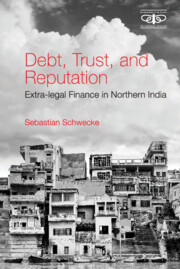2 - Contract
Published online by Cambridge University Press: 30 November 2021
Summary
This raises the question of what takes the place of law as the major source of sanctions in economic relations.
Trust, shame, and the reputational credit contract
When I started to observe participants in the elaborate arena of social and economic practices that constitutes the reputational economy of debt in the north Indian city of Banaras, two correlated features became visible almost immediately. The first was the accessibility of many of the people involved, in spite of the extra-legal and at times even straightforwardly illegal character of the financial practices they partook in. The second was the apparent lack of details in the information I learned from speaking to debtors compared to what I managed to learn from creditors. Let me begin by discussing the first of these features. Markets depend on information flows. They are, in fact, embedded in information flows. Narges Erami and Arang Keshavarzian (2015) have highlighted the difference between a criminal market and a bazaar in their study on the latter's involvement in smuggling activities in post-revolutionary Iran. The criminal market, in this example, needed to rely on information flows that were clandestine, thus compromising the availability of robust knowledge on who was involved in dealings, to what extent, and in which role. Not knowing or, better from an anthropological perspective, not having sufficient information to trust one's assessment of the reliability and robustness of information (Corsín Jiménez 2011) introduced high levels of suspicion into a market that was characterized by knowability, the ability to add to the information readily available and identify its robustness at need.
Conservative norms and ethics – a recurring feature of ‘traditional’ mercantile groups visible in the Iranian bazaar as much as in a plethora of contexts across temporal, spatial, and cultural boundaries – nurtured by shared religious practice, shared social space and cultural practice, and strong commonalities in socio-economic organization rooted in class, community, and kinship structures created a sense of being able to know. The sense informed a sense of being able to trust, and the latter in turn facilitated recourse to collective action to punish transgressions once the loosely organized collective of merchants reached the conclusion that such a transgression had occurred.
- Type
- Chapter
- Information
- Debt, Trust, and ReputationExtra-legal Finance in Northern India, pp. 12 - 65Publisher: Cambridge University PressPrint publication year: 2022

